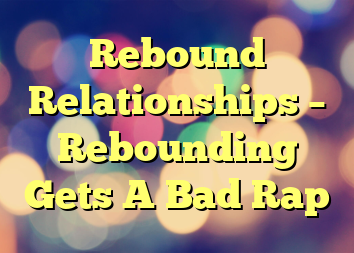Rebound Relationships – Rebounding Gets A Bad Rap
Rebound relationships often get a bad rap. They are almost always discounted as being token, fake relationships with one partner’s sole purpose of just getting over someone else, and not so much respect or regard for the other person in the couple. Is rebounding always negative? here are some of the aspects you need to consider before entering into these types of relationships.
Rebound relationships are the ones that you enter into when you are still hurting from your past relationship and/or breakup. Whether you want to admit it or not, you go through a sort of grieving process when you end a relationship, even if you were the one who decided to end it or if you agreed with the decision that it was over. In any case, things will be different after your break up, especially if the relationship, or marriage, was a long one. But in your grieving period, you will likely experience a roller coaster of emotions that range from sadness, to anger, to relief, and hope. During this time, you are sort of creating your new self, without your old partner. Some people prefer to do this on their own. But many decide to fill any emptiness or bad feelings with another person.
Often times, when you are in your grieving stage, your self-esteem will be down in the dumps, so if anyone demonstrates any kind of interest in you again, it soothes your ego and offers a chance to fill up the empty void you feel. Some decide to just date on the surface level because it makes them feel good and they don’t risk getting into another situation that they are not ready for. But rebound relationships happen when the occasional dating turns into more frequent dates with one person, and then seeing only this person, and once again, getting into a physical and intimate relationship.
It’s been reported that up to 90% of these types of relationships fail, many times because the other person in the relationship is being hurt (intentionally or not) in some way by the fact that the “rebounder” is still going through the grieving process. And, often, the grieving process started not after the relationship was ended, but while it was disintegrating.
If you and your new partner know about the problems of the rebound, it may help. However, the best advice is to avoid jumping headfirst into another relationship when you are fresh off of the old one. Take the time to heal, realize your mistakes, and to figure out what you do and do not want. How do you know when you are ready to get back into the dating game? Everyone is different, but basically, when you start to feel more confident about yourself by yourself (not only when someone gives you a compliment), and have a better idea of what you want out of life. It’s worth mentioning that some people actually go through a couple of rebound relationships before they enter into a solid one.
